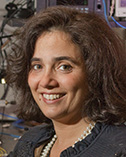
Michal Lipson
Columbia University
|
Primary Section: 13, Physics Secondary Section: 33, Applied Physical Sciences Membership Type:
Member
(elected 2019)
|
Biosketch
Prof. Michal Lipson is the Eugene Higgins Professor at Columbia University. She graduated from Technion, Israel in 1992 with a B.S in Physics, followed by a M.S. in Physics in 1994 and a Ph.D. in Physics in 1998 from the same university. Prof. Lipson pioneered critical building blocks in the field of Silicon Photonics, which today is recognized as one of the most promising directions for solving the major bottlenecks in microelectronics. She is the inventor of over 30 issued patents and has co-authored more than 200 scientific publications. She was awarded the NAS Comstock Prize in Physics, the MacArthur Fellowship, the Blavatnik Award, the Optical Society's R. W. Wood Prize, the IEEE Photonics Award, and has received an honorary degree from Trinity College, University of Dublin. Since 2014 every year she has been named by Thomson Reuters as a top 1% highly cited researcher in the field of Physics. She is a member of The National Academy of Sciences.
Research Interests
Michal Lipson's research focuses on Nanophotonics and includes the investigation of novel phenomena, as well as the development of novel devices and applications. Lipson pioneered critical building blocks in the field of Silicon Photonics, which today is recognized as one of the most promising directions for solving the major bottlenecks in microelectronics. In 2004, she showed the ability to tailor the electro-optic properties of silicon, which represent critical advances that led to the explosion of silicon photonics research and development. Today more than one thousand papers published yearly involve devices and circuits based on Lipson's original modulators, as well as on other silicon photonics devices demonstrated by her group including slot waveguides and inverse tapers. Silicon photonics has inspired new research areas including nonlinear silicon photonics, optomechanics, topological photonics, and others. The growth of silicon photonics has also been evident in industry with an increasing number of companies developing silicon photonics products (IBM and Intel, HP Aurrion, Melannox, Apic, Luxtera, etc).

